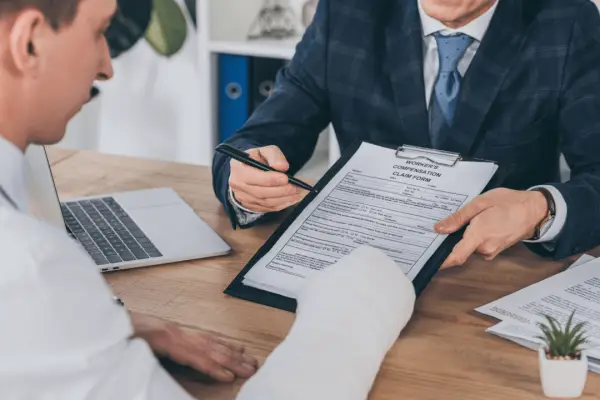
What Makes a Good Personal Injury Lawyer | 7 Essential Qualities
Essential Traits: What Makes a Good Personal Injury Lawyer
What makes a good personal injury lawyer can determine whether you receive fair compensation or settle for less than you deserve. The right attorney combines legal expertise, negotiation skills, and genuine care for client outcomes. Understanding these crucial qualities helps accident victims make informed decisions when selecting legal representation.
Choosing the wrong lawyer can cost thousands in potential compensation and cause unnecessary stress during recovery. This guide reveals the seven key traits that distinguish exceptional personal injury attorneys from mediocre ones.
Core Qualifications: Legal Experience and Specialization
A good personal injury lawyer focuses exclusively on personal injury cases rather than practicing general law. Specialized attorneys understand the nuances of car accident claims, slip-and-fall incidents, and other injury cases. They stay current with evolving personal injury laws and have established relationships with medical experts, investigators, and other professionals.
Experience handling cases similar to yours matters significantly. An attorney who has successfully resolved hundreds of car accident cases will better understand what makes a good personal injury lawyer in your specific situation. Look for lawyers with at least five years of focused personal injury experience and a proven track record of favorable settlements and verdicts.
Trial Experience and Courtroom Skills
Many personal injury cases settle outside court, but insurance companies negotiate more seriously when they know your lawyer will take the case to trial if necessary. Attorneys with strong courtroom experience often secure better settlement offers because insurers respect their willingness to fight for maximum compensation.
Communication Excellence: Client-Centered Approach
What makes a good personal injury lawyer stand out is exceptional communication skills. Top attorneys return calls promptly, explain legal processes clearly, and keep clients informed throughout their case. They translate complex legal terminology into understandable language and ensure clients feel heard and valued.
Effective personal injury lawyers also demonstrate empathy and understanding. They recognize that clients are dealing with physical pain, emotional trauma, and financial stress. The best attorneys provide reassurance while setting realistic expectations about case timelines and potential outcomes.
Accessibility and Responsiveness
Quality personal injury lawyers maintain open communication channels. They provide multiple contact methods and respond to client inquiries within 24 hours. During critical case developments, they proactively reach out rather than waiting for clients to call them.
Investigation Resources: Building Strong Cases
Determining what makes a good personal injury lawyer often comes down to their investigative capabilities. Exceptional attorneys have access to accident reconstruction experts, medical professionals, and private investigators who can strengthen your case. They preserve crucial evidence, interview witnesses promptly, and work with specialists to establish liability and document damages.
The National Highway Traffic Safety Administration (NHTSA) provides valuable crash data that experienced lawyers utilize to support their cases. Top attorneys also collaborate with the Occupational Safety and Hazardous Administration (OSHA) when workplace injuries occur and understand how to leverage Centers for Disease Control and Prevention (CDC) injury statistics in their arguments.
Strategic Negotiation: Maximizing Settlements
Insurance companies employ experienced adjusters and lawyers to minimize payouts. What makes a good personal injury lawyer effective is their ability to counter these tactics with strategic negotiation skills. They understand insurance company procedures, know fair settlement ranges for different injury types, and refuse lowball offers.
Skilled personal injury attorneys also calculate comprehensive damages including future medical expenses, lost earning capacity, and pain and suffering. They ensure clients receive compensation for both current and anticipated costs related to their car accident injuries and recovery.
Financial Support: Working on Contingency
Most reputable personal injury lawyers work on contingency fee arrangements, meaning clients pay nothing unless they win their case. This arrangement demonstrates the attorney’s confidence in their ability to secure favorable outcomes and removes financial barriers for injured individuals seeking legal representation.
Final Thoughts: Choosing Your Legal Advocate
What makes a good personal injury lawyer ultimately depends on their combination of experience, communication skills, resources, and genuine commitment to client success. The right attorney will fight tirelessly for maximum compensation while providing compassionate support during your recovery journey.
Take Action Today: Get Expert Legal Help
Don’t let insurance companies minimize your claim or pressure you into accepting inadequate settlements. Contact experienced personal injury attorneys who understand what makes a good personal injury lawyer and have the skills to protect your rights. Get your free case evaluation today and discover how professional legal representation can maximize your compensation.
Frequently Asked Questions
1. How do I know if a personal injury lawyer is experienced enough?
Look for attorneys with at least five years of focused personal injury practice, numerous successful case results, and positive client testimonials. Ask about their specific experience with cases similar to yours.
2. What should I expect during my first consultation?
A good personal injury lawyer will evaluate your case details, explain your legal options, discuss potential outcomes, and answer all your questions without charging consultation fees.
3. How long do personal injury cases typically take?
Case duration varies depending on injury severity, liability disputes, and insurance company cooperation. Simple cases may resolve in months, while complex cases can take one to three years.
4. What percentage do personal injury lawyers typically charge?
Most personal injury attorneys may charge 33-40% contingency fees, meaning they only get paid if you win your case. This percentage covers their legal fees and case expenses.
5. Should I accept the insurance company's first settlement offer?
Never accept initial offers without consulting a qualified personal injury lawyer. Insurance companies typically start with lowball offers, and experienced attorneys can often negotiate significantly higher settlements.
Key Takeaways
- Look for personal injury lawyers with specialized experience and proven track records in cases similar to yours
- Choose attorneys who communicate clearly, respond promptly, and demonstrate genuine care for client outcomes
- Ensure your lawyer has strong investigative resources and relationships with medical experts and specialists
- Select attorneys who work on contingency fees and have demonstrated negotiation skills against insurance companies
- Verify that your lawyer has trial experience and willingness to take cases to court when necessary
Free Accident Claim Review
Complete the form to have an attorney review your accident claimCOMPLETE THE FORM TO BE CONNECTED WITH AN ACCIDENT ATTORNEY
No Matching Partners at the Moment
Thank you for your inquiry but there are no matches for you at this time. Please come back later and try again.
Recent Posts
- What Documentation Strengthens a Personal Injury Case: Essential Evidence Guide
- How Do Insurance Companies Evaluate Injury Claims? Get Maximum Compensation
- What Injuries Qualify for Compensation in Personal Injury Claims? Navigating the Legal System
- What Evidence Is Needed for a Personal Injury Claim to Win Compensation?
- How Personal Injury Claims Work: Your Step-by-Step Legal Journey
Archives
- March 2026
- February 2026
- January 2026
- December 2025
- November 2025
- October 2025
- September 2025
- August 2025
- July 2025
- June 2025
- May 2025
- March 2025
- February 2025
- January 2025
- October 2024
- September 2024
- August 2024
- July 2024
- June 2024
- May 2024
- April 2024
- March 2024
- February 2024
- January 2024
- December 2023
- November 2023
- October 2023
- September 2023
- August 2023
- July 2023
- June 2023
- May 2023
- March 2023
- February 2023
- January 2023
- November 2022
- October 2022
- September 2022
- August 2022
- May 2022
- April 2022
- March 2022
- February 2022
- January 2022
- December 2021
- November 2021





